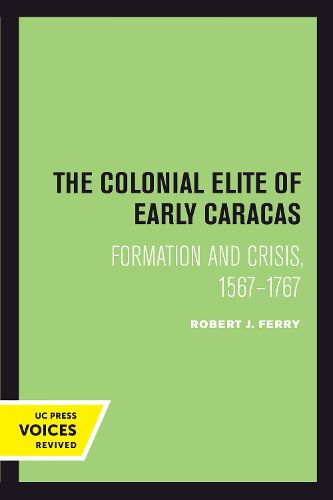Readings Newsletter
Become a Readings Member to make your shopping experience even easier.
Sign in or sign up for free!
You’re not far away from qualifying for FREE standard shipping within Australia
You’ve qualified for FREE standard shipping within Australia
The cart is loading…






Combining traditional documentary research with new analytical strategies, Robert J. Ferry creates a rich, three-dimensional picture of early Caracas. His reconstitution and interpretation of important genealogical histories provide a model for historical studies of Latin American and other societies.
Ferry’s work partially eclipses previously accepted ideas about colonial Caracas. He shows how the society was dominated by a commercial-agricultural elite and demonstrates that women were responsible for arranging marriages and maintaining family lineages, that marriages among first cousins were very common, and that elite residence was matrifocal.
The Colonial Elite of Early Caracas focuses on the salient features of the society and economy: agriculture, commerce, and labor. The first section treats the seventeenth-century transition from Indian encomienda labor to African slave labor. The society created by slavery and the cacao trade in the eighteenth century is the main subject of the second section of the book. Throughout, Ferry leads the reader to a deeper understanding of the elite planters of Caracas, who were wheat farmers in the seventeenth century and cacao hacienda owners in the eighteenth.
Ferry also explores how some families suceeded in retaining wealth and local authority from one generation to the next. That success is momentarily halted in the 1730s and 1740s, and the revolt of Juan Francisco de Leon in 1749 is viewed as a crisis of both the colony’s elite and the smallholder, immigrant class to which Leon himself belonged. The response to Leon’s rebellion represents a major effort on the part of the Spanish crown to restructure royal authority in the colony, arguably the first of the Bourbon reforms in the American colonies.
This title is part of UC Press’s Voices Revived program, which commemorates University of California Press’s mission to seek out and cultivate the brightest minds and give them voice, reach, and impact. Drawing on a backlist dating to 1893, Voices Revived makes high-quality, peer-reviewed scholarship accessible once again using print-on-demand technology. This title was originally published in 1989.
$9.00 standard shipping within Australia
FREE standard shipping within Australia for orders over $100.00
Express & International shipping calculated at checkout
Combining traditional documentary research with new analytical strategies, Robert J. Ferry creates a rich, three-dimensional picture of early Caracas. His reconstitution and interpretation of important genealogical histories provide a model for historical studies of Latin American and other societies.
Ferry’s work partially eclipses previously accepted ideas about colonial Caracas. He shows how the society was dominated by a commercial-agricultural elite and demonstrates that women were responsible for arranging marriages and maintaining family lineages, that marriages among first cousins were very common, and that elite residence was matrifocal.
The Colonial Elite of Early Caracas focuses on the salient features of the society and economy: agriculture, commerce, and labor. The first section treats the seventeenth-century transition from Indian encomienda labor to African slave labor. The society created by slavery and the cacao trade in the eighteenth century is the main subject of the second section of the book. Throughout, Ferry leads the reader to a deeper understanding of the elite planters of Caracas, who were wheat farmers in the seventeenth century and cacao hacienda owners in the eighteenth.
Ferry also explores how some families suceeded in retaining wealth and local authority from one generation to the next. That success is momentarily halted in the 1730s and 1740s, and the revolt of Juan Francisco de Leon in 1749 is viewed as a crisis of both the colony’s elite and the smallholder, immigrant class to which Leon himself belonged. The response to Leon’s rebellion represents a major effort on the part of the Spanish crown to restructure royal authority in the colony, arguably the first of the Bourbon reforms in the American colonies.
This title is part of UC Press’s Voices Revived program, which commemorates University of California Press’s mission to seek out and cultivate the brightest minds and give them voice, reach, and impact. Drawing on a backlist dating to 1893, Voices Revived makes high-quality, peer-reviewed scholarship accessible once again using print-on-demand technology. This title was originally published in 1989.